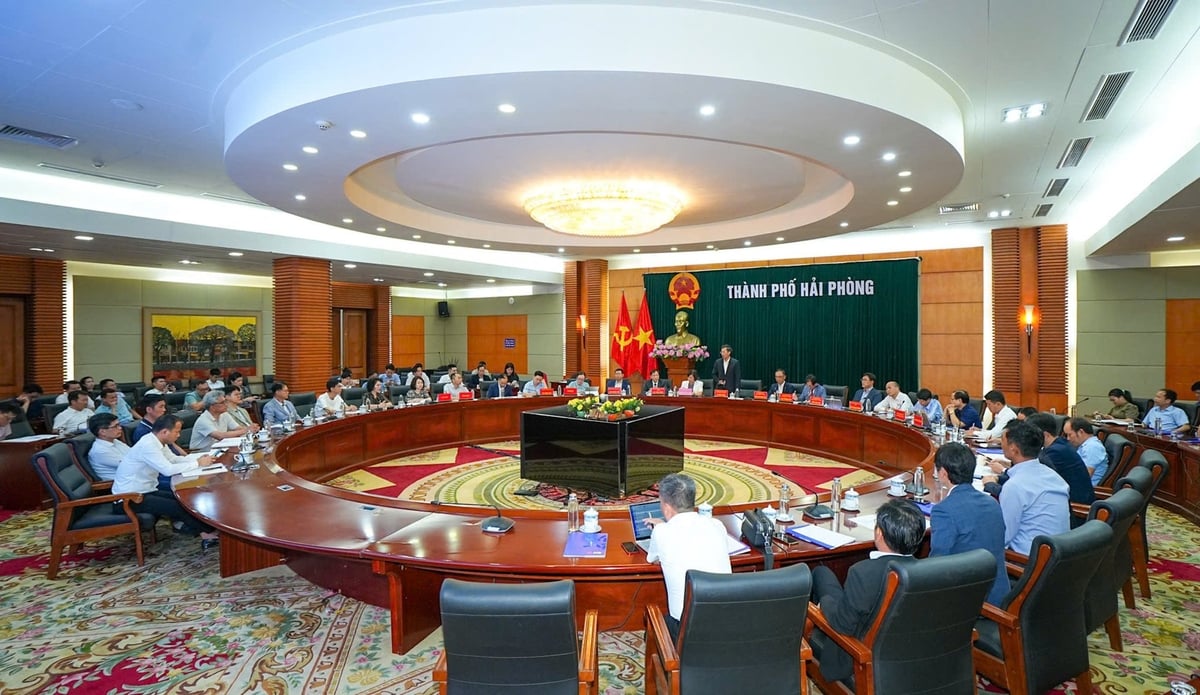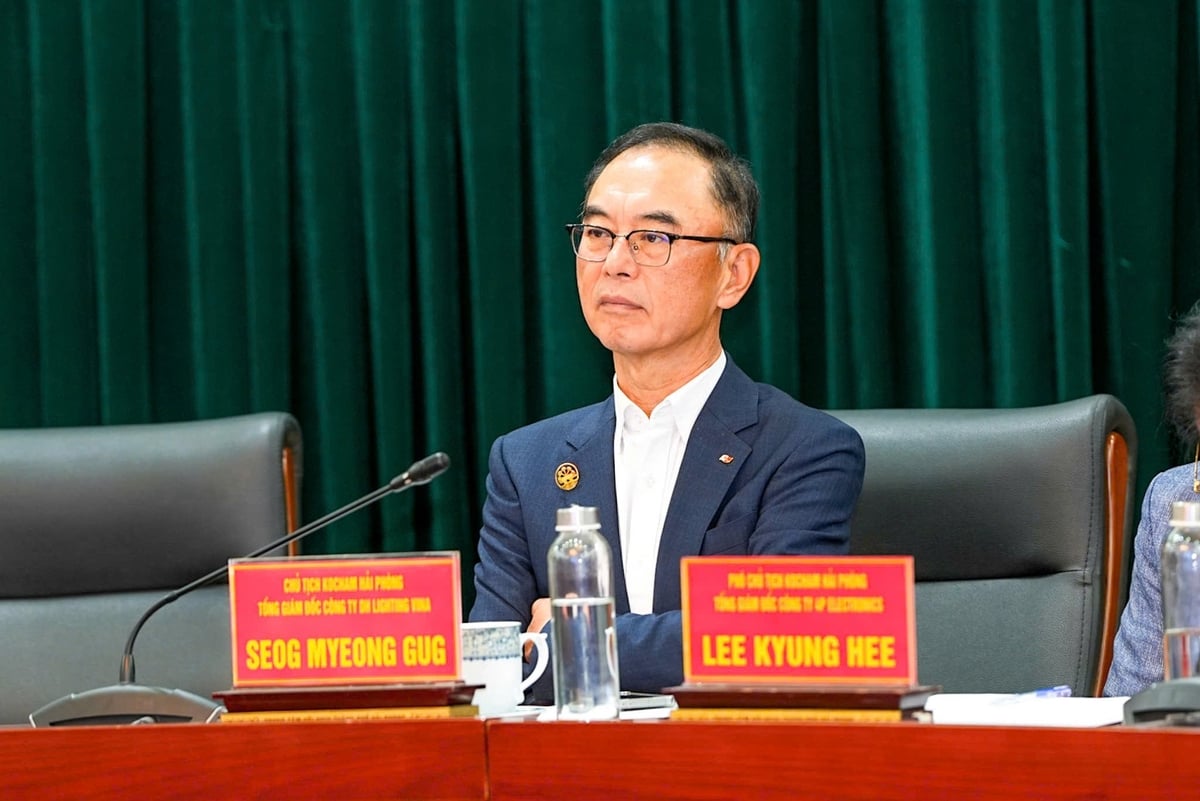December 30, 2025 | 19:30 GMT +7
December 30, 2025 | 19:30 GMT +7
Hotline: 0913.378.918
December 30, 2025 | 19:30 GMT +7
Hotline: 0913.378.918

Overview of the seminar. Photo: Dam Thanh.
The Hai Phong Department of Foreign Affairs recently coordinated with the Hai Phong Vietnam–Korea Friendship Association and the Korean Chamber of Commerce in Hai Phong (KOCHAM Hai Phong) to organize a seminar titled "Opportunities and challenges for Vietnamese and Korean enterprises in Hai Phong city".
The seminar is part of a series of activities commemorating the 30th anniversary of Vietnam–Korea diplomatic relations, reflecting the deepening cooperation between the two countries in various fields, particularly in economics and investment.
According to Le Anh Quan - Standing Vice Chairman of the Hai Phong People's Committee, South Korea is currently the second-largest investor in terms of the number of projects (186 projects) and ranks first in total registered investment capital in Hai Phong, reaching 14.2 billion USD. Projects from Korean investors are operating effectively, with a strong focus on high-tech products. These projects contribute to increasing the technological and scientific value of local enterprises, boosting export turnover, generating employment, and making significant contributions to the city’s budget. Hai Phong pledges to always accompany and create the most favorable conditions for FDI enterprises to feel secure in investing long-term, efficiently, and sustainably in the locality. In addition, Hai Phong is actively promoting several cooperative programs with South Korean provinces and cities such as Incheon, Ulsan, and Busan to attract more high-quality investment flows and expand economic diplomatic relations.
The Standing Vice Chairman of the Hai Phong People’s Committee also stated that, in the near future, the city will continue focusing on improving the investment and business environment, supporting enterprises in accessing land, credit, human resources, and training high-quality labor. At the same time, the city will promote support for domestic businesses, especially small enterprises, to build capacity for cooperation with FDI enterprises, access advanced technology, and effectively partner with Korean companies. As part of the investment promotion program, Hai Phong also signed memoranda of understanding with several major South Korean corporations such as LG, Hyosung, and Hanwha to explore investments in high-tech projects and R&D centers in the area.
Seog Myeong Gug, Chairman of the Korean Chamber of Commerce in Hai Phong (KOCHAM), stated that the seminar is an opportunity for Vietnamese and Korean enterprises in Hai Phong to gain deeper understanding and expand cooperation, especially in the fields of auxiliary product supply and human resources.

Chairman of KOCHAM Hai Phong, Seog Myeong Gug, spoke at the seminar. Photo: Dam Thanh.
This cooperation helps FDI enterprises reduce production costs, enhance competitiveness, and contribute to strengthening their position in the international market. KOCHAM also emphasized the desire for Hai Phong authorities to continue improving infrastructure, including seaport systems, logistics, and transportation networks connected to industrial zones, to meet the rapid development needs of Korean enterprises.
At the seminar, Lee Kyung Hee, Vice Chairman of KOCHAM Hai Phong, shared specific solutions to improve the investment and business environment in Hai Phong, highlighting the role of workforce quality. Hai Phong city needs to enhance the quality of education and vocational training according to international standards, focusing on key industrial sectors such as industrial engineering, automation, electronics, and artificial intelligence (AI) at local universities. In addition, KOCHAM representatives recommended that Hai Phong establish technical – technology training centers in partnership with enterprises to create a well-matched workforce from the outset for the development needs of the high-tech industry.
To further attract investment, Hai Phong is implementing many major infrastructure projects such as the construction of new industrial parks with a total area of over 7,000 hectares and the development of a Southern Coastal Economic Zone covering about 20,000 hectares, aiming toward a green growth model and circular economy. The city is also focusing on developing a modern logistics system, integrated with expressways and seaport infrastructure, to enhance supply chain efficiency and attract investment in the logistics service sector.
In addition, the city is intensifying administrative reforms, shortening the time required to complete investment procedures, and improving the quality of investment promotion to create the most favorable conditions for investors, especially Korean businesses, to implement new projects and expand operations in the locality. According to statistics from the Hai Phong Economic Zone Authority, in the first quarter of 2025, the city attracted nearly USD 500 million in additional investment from South Korea, mainly concentrated in electronics, precision engineering, and automotive parts manufacturing. This demonstrates the growing confidence of Korean investors in Hai Phong’s investment environment and opens up broader cooperation opportunities between the two sides in the future.
Translated by Huong Giang
/2025/12/25/2157-2-170845_745.jpg)
(VAN) Amid the impacts of climate change and market competition, An Giang's agriculture is shifting toward a green, modern growth model, creating a key driving force for restructuring the sector.

(VAN) Two leading enterprises in the agricultural sector have officially cooperated to implement a sustainable value chain model for Viet Nam's shrimp industry.

(VAN) Dien Bien is speeding up ODA projects to respond to climate change and strengthen water management and disaster prevention infrastructure in pursuit of sustainable development.

(VAN) With high automation, large capacity, and a green development orientation, the Hai Duong Plant Branch is becoming an important anchor for the animal feed market.
/2025/12/01/2936-2-222331_70.jpg)
(VAN) Mortgaging his house and giving up a pharmaceutical management career, Mr. Nguyen Quang Duy succeeded in bringing Khanh Hoa's sea grapes to demanding markets such as Japan and the U.S.

(VAN) The large-scale agroforestry investment project aims to develop a leading sustainable agro-industrial center in Angola.
/2025/11/28/3433-1-212821_213.jpg)
(VAN) Many localities across the coconut land of Vinh Long are replicating emission-reducing models in production and daily life, contributing to the targets for emission reduction and green economic development.